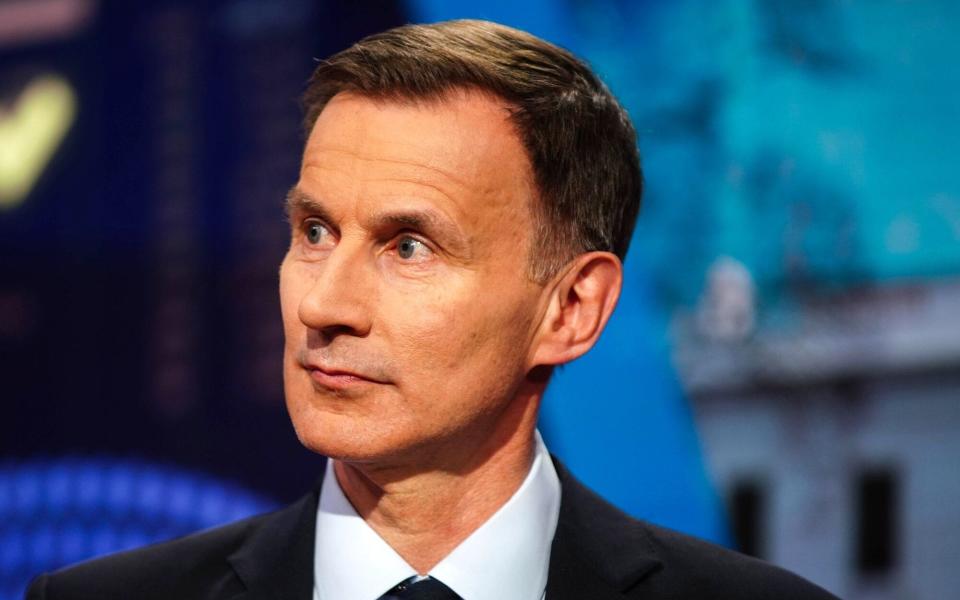Hunt risks missing debt target after National Insurance cuts, warns IMF

Jeremy Hunt’s pre-election tax cuts will keep Britain’s debt rising until the end of the decade, according to the International Monetary Fund (IMF), jeopardising the Chancellor’s goal of getting it down within five years.
The IMF said it was “critical” that the UK do more to reduce borrowing as it warned that the “significant” reductions in National Insurance (NI) announced by Mr Hunt in the Spring Budget and Autumn Statement would “worsen the debt trajectory”.
The IMF now expects Britain’s debt share to be almost equal to the size of the economy by the end of the decade, hitting 98pc of GDP in 2029.
Debt is expected to rise every year until then, hitting 97.2pc of GDP in 2028, which is significantly higher than the 96.5pc it expected in October.
This suggests the Fund believes Mr Hunt will fail to meet a self-imposed rule of getting debt falling by the end of the decade, though its measure of borrowing and debt is slightly different to the UK’s own official measure and based on calendar rather than tax years.
The Fund said its prediction of a higher UK debt trajectory was driven by Mr Hunt’s decision to cut taxes. It has previously cast doubt on the ability of the next government to slash public spending in order to meet the goal of reducing Britain’s debt, which currently stands at £2.66 trillion.
The IMF said: “Recent policy changes, such as a significant cut to NI in the UK, although part-funded by well-conceived revenue raising measures, could worsen the debt trajectory in the medium term.
“Population ageing and labour market mismatches are further expected to exert pressure on fiscal positions.”
The IMF urged governments around the world to resist the temptation to cut taxes or raise spending in the hope of winning votes in the “biggest-ever election year”.
It said: “In this great election year, governments should exercise fiscal restraint to preserve sound public finances.”
The plea came as the Chancellor hinted at the possibility of more tax cuts in the autumn. In an interview with the Financial Times, Mr Hunt said he hoped to cut taxes again “if we can”.
Mr Hunt slashed National Insurance by 2p in both the Spring Budget and Autumn Statement, saving an average worker earning £35,000 about £900 a year.
He has said it is a Tory ambition to abolish the tax altogether, which he has described as an “unfair” form of “double taxation” alongside income tax.
The IMF said funding tax cuts through scrapping non-dom perks and the extension of a windfall tax on oil giants were “well-conceived revenue raising measures”. However, the Fund warned it would not be enough to cover the cost of the policy changes.
As a result, the UK is forecast to play a key role in driving global debt levels to almost 100pc of gross domestic product by 2029.
The IMF said in its latest Fiscal Monitor: “The increase will be led by some large economies, for example, China, Italy, the United Kingdom, and the United States, which critically need to take policy action to address fundamental imbalances between spending and revenue.”
IMF predictions about the British economy have often turned out to be wrong.
Olivier Blanchard, the IMF’s former chief economist, was forced to admit that his warnings that the UK was “playing with fire” on austerity were wrong after the Fund predicted the UK would be the fastest-growing major developed economy in 2014.
Christine Lagarde, the Fund’s former managing director, also suggested the UK could slip into a “technical recession” if Britons voted to leave the European Union.
The Office for Budget Responsibility (OBR) has said that tax cuts implemented by Mr Hunt will increase the number of hours worked by the equivalent of 200,000 workers.

 Yahoo Finance
Yahoo Finance 